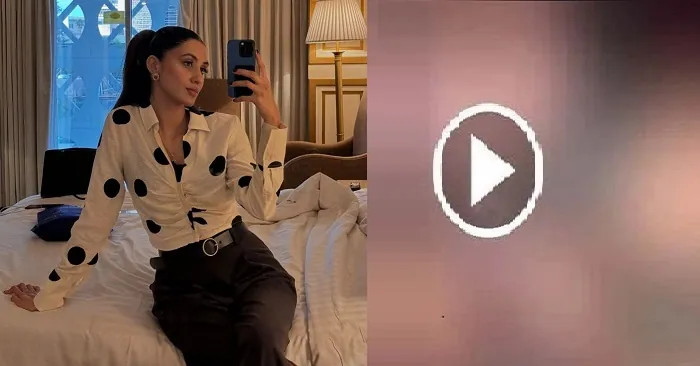In today’s fast-paced digital world, viral content spreads rapidly, often sparking intense reactions from the public. One such video, known as the Kebaya Merah viral video, has caught the attention of millions across social media platforms. The 16-minute video, featuring a woman dressed in a red kebaya (a traditional Indonesian dress) alongside a man, has raised questions surrounding online privacy, digital ethics, and the potential consequences of leaked content. Let’s dive into the details of this incident, explore what made it go viral, and discuss its implications for the future of online behavior.
What is the Kebaya Merah Viral Video?
The Kebaya Merah viral video features a woman in a red kebaya in an intimate situation with a man. While the video was originally shared privately, it was quickly leaked online and spread across various platforms, including Twitter, Telegram, and other media channels. The woman, believed to be a Bali-based influencer, has not yet confirmed her identity publicly.
Zahra Seafood 6-Minute Video: Viral or Just Hype?
The video has been making waves, generating widespread attention on Twitter, where it quickly became the subject of heated discussions. The hashtag #KebayaMerah began trending as netizens expressed both shock and anger. Many were outraged by the breach of privacy, while others took to the platform to voice their concerns about how easily personal moments can be exploited in the digital age.
Why is the Kebaya Merah Video Trending?
The widespread circulation of the video can be attributed to a number of factors:
- Shock Value: The explicit nature of the video, combined with its unexpected emergence on public platforms, shocked viewers. This reaction often fuels viral content as people are more likely to share something that invokes strong emotions.
- Breach of Privacy: Many have criticized the leak as a blatant violation of the woman’s privacy. The fact that the video was shared without her consent has sparked outrage about online harassment and the ethical implications of such leaks.
- Identity and Ethics: The video has prompted debates around digital ethics, with many questioning how far-reaching the consequences of such leaks can be. Even though the woman is suspected to be an influencer, her privacy should still be respected. Her personal life shouldn’t be fodder for public consumption without consent.
Kebaya Merah 16-Minute Viral Video Download
Kebaya Merah 16-Minute MMS Full Video
Sajal Malik Viral Video Full Telegram Link
Paro Aarti Full Viral Video Download
Paro Aarti Original Full Video Link
The Digital Ethics Behind the Kebaya Merah Incident
This viral video sheds light on an important issue—digital ethics and the importance of respecting people’s privacy online. Here are some key points to consider:
- Consent Matters: The most critical aspect of this case is the lack of consent from the woman in the video. Whether or not the video was initially intended for public consumption, the decision to share intimate moments without consent is a significant violation of privacy.
- Accountability for Leaks: The swift dissemination of the video also raises questions about the responsibility of social media platforms and digital users. Should platforms do more to prevent explicit content from spreading so easily? How should they handle instances of privacy violations?
- The Impact on Mental Health: Being the subject of an online leak can have serious consequences on an individual’s mental health. The emotional toll of such exposure can be overwhelming, and it’s essential to consider the long-term effects of these actions on the people involved.
Official Response and Legal Implications
Indonesian authorities are actively investigating the leak of the Kebaya Merah video, with officials seeking both the individual who recorded the video and those responsible for sharing it. This is a step toward holding people accountable for the unauthorized distribution of private content, but it also highlights the broader issue of digital privacy rights in an increasingly connected world.
As more cases of leaked content emerge, it’s clear that governments and tech companies need to take stronger actions to protect users from such invasions of privacy. This could involve more stringent regulations on content sharing and greater consequences for those who intentionally leak private videos.
Conclusion
The Kebaya Merah viral video serves as a stark reminder of the fragile nature of privacy in today’s digital landscape. While social media platforms offer unprecedented connectivity, they also come with a dark side: the ease with which private content can be shared and spread without consent. This incident has sparked important conversations about the ethical use of digital media, the importance of consent, and the need for stronger regulations surrounding online privacy.
As users of social media, it’s crucial that we all reflect on our roles in sharing content online and the potential consequences of our actions. In the case of the Kebaya Merah video, the conversation surrounding privacy, digital ethics, and consent is far from over, and it’s a topic that will continue to evolve in the digital age.
Remember, before you share or engage with viral content, think about the potential impact it may have on the people involved. After all, digital responsibility starts with each of us.
Stay updated with the latest discussions surrounding digital privacy and ethics by following our blog for more insights and analyses.






